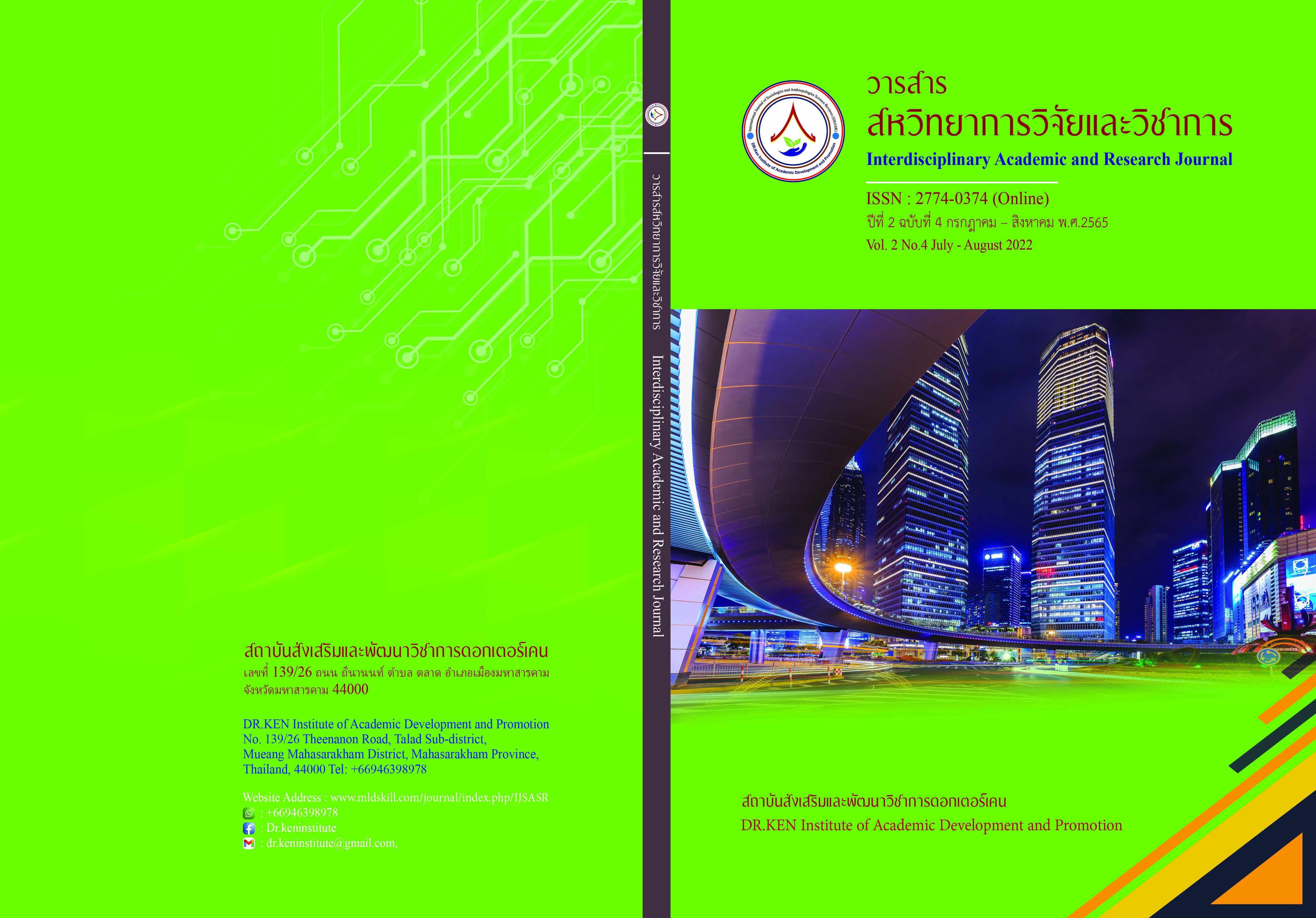Guidelines for Creating Sustainable Happiness Through a Process of Reconciliation in Community
DOI:
https://doi.org/10.14456/iarj.2022.44Keywords:
Sustainable Happiness; , Mediation;, Harmony; , ConstructivismAbstract
Thai society is a multicultural society, also known as “Multicultural Society. There is a loose structure with diversity in ethnicity, religion, language, dress, existence, etc. The differences between the different societies, races, religions, languages, and daily living of the people of the societies arise from differences in the physical features of the area. When there are cultural differences in society, there will be conflicts with each other within the community. However, the people in that community all want peace and freedom from conflict, thus ending the conflict through mediation is a negotiation between many parties. Therefore, the study of guidelines for creating sustainable happiness through the mediation process in the community is aimed at (1) To study the principles and guidelines for the dispute resolution process according to the mediation process. (2) Study the information about disputes that arise both at the individual level and the level of various social groups. And (3) to study the process of transferring dispute mediation techniques in the community to create lasting reconciliation. This research is mixed-use research using quantitative research to collect population data in the Ban Siew Noi area, Chaiyaphum province, and qualitative research from interviews with key informants as a group of village leaders. The results showed that:
The principle of the dispute resolution process according to the reconciliation process in the community begins with the creation of happiness in society. That is to say, if Thailand's political situation returns to calm, it will improve the well-being of the people, where social turmoil deteriorates the economy and people's livelihoods, and solving political problems should be a priority. Resolving conflicts and disputes within the community may be managed by creating happiness through coexistence starting with family activities, organizing activities within the community, participating in religious or cultural activities, and community traditions, and not violating the personal rights of people in the community. A society that everyone should always practice. Thus, Sustainable happiness in the community comes from the creation of livelihood in the community, the people in the community, love, compassion, caring for each other, as well as wishing for others to be happy together.
References
ฉันทนา รวงผึ้ง, (2563). การสร้างความสุขอย่างยั่งยืนเชิงพุทธบูรณาการ. บัณฑิตวิทยาลัย มหาวิทยาลัยมหาจุฬาลงกรณราชวิทยาลัย. วารสารมหาจุฬาวิชาการ. 7 (3), 1-16.
ชมพูนุท คงพุนพิน, (2562). การสรรค์สร้างพื้นที่สาธารณะชุมชนเมืองเพื่อส่งเสริมอัตลักษณ์เชิงสังคมอย่างยั่งยืน. วิทยานิพนธ์ปรัชญาดุษฎีบัณฑิต สาขาวิชาสหวิทยาการสภาพแวดล้อมสรรค์สร้าง คณะสถาปัตยกรรมศาสตร์และการผังเมือง มหาวิทยาลัยธรรมศาสตร์
ชุติมา ภูบุญเต็ม. (2562). การไกล่เกลี่ยข้อพิพาทในศาลปกครอง ศึกษากรณีการชดใช้ค่าสินไหมทดแทนเกี่ยวกับความรับผิดทางละเมิด แก่หน่วยงานทางปกครอง. สารนิพนธ์นิติศาสตรมหาบัณฑิต กลุ่มวิชากฎหมายมหาชน คณะนิติศาสตร์ มหาวิทยาลัยศรีปทุม.
ประจักษ์ ปฏิทัศน์, (2562). ความสุขอย่างยั่งยืนของครอบครัวไทยยุคดิจิทัล. บรรยายในที่ประชุมคณะกรรมการศึกษาและพัฒนาความรู้ทางจิตวิทยาและสังคม ราชบัณฑิตยสภา เมื่อวันพุธที่ 10 เมษายน พ.ศ.2562
ประเวศ วะสี, (2557). ปฏิรูปสังคม ชุมชนเข้มแข็ง พลังพลเมืองเข้มแข็ง หัวใจของการปฏิรูปประเทศ.วารสารวิทยาศาสตร์และเทคโนโลยี, 24 (4), 673-681.
พระมหามงคลกานต์ ฐิตธมฺโม, คงสฤษฎ์ แพงทรัพย์ และพูนศักดิ์ กมล, (2562). การอยู่ร่วมกันของคนในสังคมพหุวัฒนธรรมในประเทศไทย กรณีศึกษาสังคมพหุวัฒนธรรมในอำเภอเมือง จังหวัดเชียงใหม่. วารสารมหาจุฬาวิชาการ. 6 (2), 46-59.
เพลินตา ตันรังสรรค์, (2553). กระบวนการยุติธรรมเชิงสมานฉันท์กับการกระทำความผิดอาญาของเด็กหรือเยาวชน. จุลนิติ, 7(6), 54-62.
วันชัย วัฒนศัพท์, (2550). ความขัดแย้ง : หลักการและเครื่องมือแก้ปัญหา. หนังสือชุดความรู้ด้านการจัดการความขัดแย้งด้วยสันติวิธี. พิมพ์ครั้งที่ 3 เล่ม 1. สถาบันพระปกเกล้า นนทบุรี
วิชุดา มาลาสาย. (2562), การพัฒนารูปแบบการเรียนการสอน เพื่อเสริมสร้างความสามารถในการแก้ปัญหาอย่างสร้างสรรค์ทางคณิตศาสตร์ ของนักเรียนชั้นมัธยมศึกษาปีที่ 6 โรงเรียนสว่างแดนดิน. สำนักงานคณะกรรมการการศึกษาขั้นพื้นฐาน กระทรวงศึกษาธิการในโครงการวิจัยและพัฒนานวัตกรรมแลกเป้า สพฐ. ปีงบประมาณ 2561
สำนักทะเบียนท้องถิ่นเทศบาลเมืองชัยภูมิ. (2564). ข้อมูลประชากรในพื้นที่อำเภอเมืองชัยภูมิ. [Online] สืบค้นจาก http://www.chaiyaphummunicipality.com/?page_id=11635
เสาวลักษม์ กิตติประภัสร์และคณะ, (2553). พัฒนาการแนวคิดเรื่อง ความสุขที่เกี่ยวข้องกับประโยชน์สุข และเศรษฐกิจพอเพียง. เครือข่ายงานวิจัยนานาชาติเพื่อสังคมอยู่เย็นเป็นสุข (ไอราห์)
อรรถกร เฉยทิม, (2560). ความสุขของผู้สูงอายุในชมรมผู้สูงอายุ เขตกรุงเทพมหานคร. วิทยานิพนธ์ศิลปศาสตรบัณฑิต. มหาวิทยาลัยศิลปากร
Cristian Bühring-Uhle, (1996). Arbitration and Mediation in International Business. Alphen aan denRijn :Klower Law.
Taro Yamane(1973 ). Statistics: An Introductory Analysis. 3rd Edition: New York. Harper and Row. Publications. Vroom, H. V. (1967). Work and Motivation.
Downloads
Published
How to Cite
Issue
Section
License
Copyright (c) 2022 Kreangsak Chokwarakul

This work is licensed under a Creative Commons Attribution-NonCommercial-NoDerivatives 4.0 International License.
Copyright on any article in the Interdisciplinary Academic and Research Journal is retained by the author(s) under the under the Creative Commons Attribution-NonCommercial-NoDerivatives 4.0 International License. Permission to use text, content, images, etc. of publication. Any user to read, download, copy, distribute, print, search, or link to the full texts of articles, crawl them for indexing, pass them as data to software, or use them for any other lawful purpose. But do not use it for commercial use or with the intent to benefit any business.
















.png)


